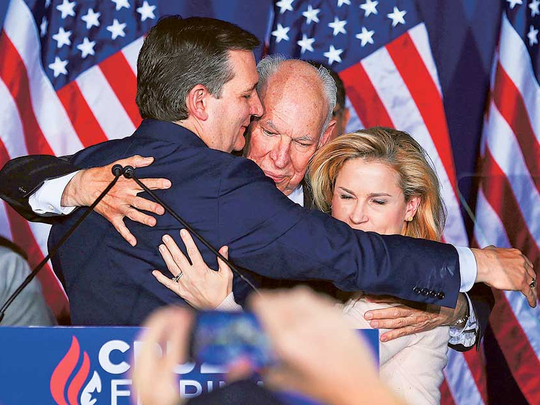
WASHINGTON: Donald Trump, the celebrity mogul whose brash and unorthodox presidential bid was counted out time and again, became the de facto Republican nominee on Tuesday night after a runaway victory in Indiana’s primary forced his chief rival, Ted Cruz, to quit the race.
Trump overcame a spirited last stand by Cruz — and a patchwork movement of Republicans working desperately to derail him in fear that his polarising politics could doom the party — to gallop to the nomination. Indiana’s results positioned him to easily accumulate the 1,237 delegates required to avert a contested convention.
Even as Ohio Governor John Kasich vowed to continue his long-shot campaign, Republican National Chairman Reince Priebus declared Trump the “presumptive nominee” and urged all Republicans to unite behind him.
In Indiana, a large manufacturing state battered by shifts in the global economy, Trump triumphed on the power of a populist pitches against free trade as well as by channelling the passions of voters who are distrustful of the nation’s political and economic systems.
As Trump claimed the mantle of GOP standard-bearer on Tuesday night, he was uncharacteristically measured. He remarked on his unlikely journey — “It’s been some unbelievable day and evening and year ... a beautiful thing to behold” — and promised Republicans that he would not let them down.
Hillary Clinton, who campaigned on Tuesday in the general election battleground of Ohio, now has her focus squarely on Trump. In a statement acknowledging Trump’s status as presumptive nominee, Clinton campaign chairman John Podesta said, “Throughout this campaign, Donald Trump has demonstrated that he’s too divisive and lacks the temperament to lead our nation and the free world. With so much at stake, Donald Trump is simply too big of a risk.”
The Indiana results capped an especially explosive day in the Republican race. In a last gasp on Tuesday morning, Cruz unloaded a litany of personal charges against Trump — a striking shift in tone that conveyed both the Texas senator’s frustrations with his fading fortunes and his freedom to finally speak his mind about the rival he once praised lavishly.
But as Trump savoured what his family members described as a shocking evening, he strived to be magnanimous in his remarks and singled out Cruz for praise. “Ted Cruz — I don’t know if he likes me or he doesn’t like me, but he is one hell of a competitor,” Trump said. “He is a tough, smart guy. And he has got an amazing future.”
In a race that began with 17 candidates — including four sitting governors, four sitting senators and an astoundingly well-funded scion of the Bush political dynasty — it was Trump who won over the party’s most restive and confrontational voters. He looks to California, which awards 172 delegates on June 7, the final day of primary voting, to make his nomination officially secure.












